Richard Henry Pratt requests authority to increase the number of pupils at the Carlisle Indian School for the upcoming school year. Pratt notes that he has corresponded with individuals from the Osage, Pueblo, and White Earth Agencies and they have noted they would like to increase the number of students at Carlisle. Pratt indicates that if the…
1884
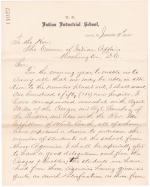
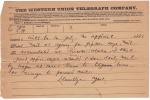
William H. H. Llewellyn, U.S. Indian Agent for the Mescalero and Jicarilla Agency, informs the Office of Indian Affairs of a delay in sending students to Carlisle due to the Texas and Pacific Railway being washed out in places.
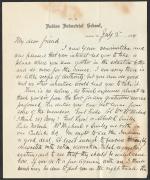
Superintendent Richard Henry Pratt writes to Doctor Cornelius Rea Agnew regarding Agnew's nomination to an unnamed committee. Pratt also discusses his ability to recruit more students thanks to the passing of the Indian Appropriations Bill. Transcript included.
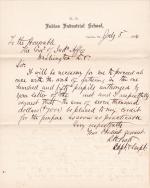
Richard Henry Pratt requests that $7000 be placed to his credit in order to gather the 150 students authorized by the Indian Affairs Office.
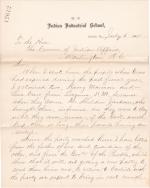
Richard Henry Pratt requests authority to return three students whose terms have expired. Two of the students, Lena Carr and Harry Marmon, stayed behind because of instructions from Dr. Sheldon Jackson but whose parents have since been requested they return. Pratt has also kept Kise Williams to manage the Harness Shop until he can find a…
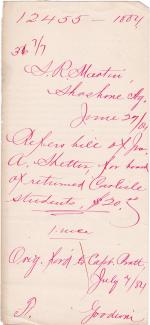
S. R. Martin refers bill of A. Shetter for board of returned Carlisle students for $20. The original was forwarded to Richard Henry Pratt.
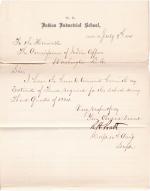
Estimate of funds for the third quarter of 1884 amounting to $21,108.00 for support of the school. Richard H. Pratt also requests additional funds amounting to $6,105.00 for regular employee pay.
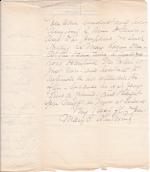
Mary E. Whitcomb inquires of Richard Henry Pratt if there are any vacancies at the Carlisle Indian School for a teacher due to an increase in the number of students. Pratt forwards the letter to the Commissioner of Indian Affairs noting that the increase in students additional teachers would be of help.
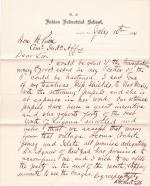
Richard Henry Pratt requests the approval for his request for $7000 in order to transport pupils to Carlisle. In particular, Pratt notes that one of the Carlisle Indian School teachers who returned with Pueblo students has seen 40 students from Laguna request to be enrolled at Carlisle. This is in addition to other Pueblo villages as well as…
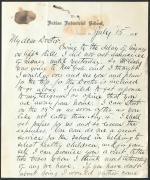
Superintendent Richard Henry Pratt writes to Doctor Cornelius Rea Agnew attempting to arrange a visit, as well as a trip to the west to recruit students. Pratt asks Agnew to come along to help select healthy children, and suggests that they rest in the Las Vegas, New Mexico Hot Springs. Transcript included.
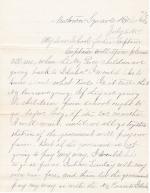
Luke Phillips, a member of the Nez Perce Nation, requests to be sent home along with the Nez Perce students. Richard Henry Pratt forwards the request and notes that he has argued with Phillips to stay but believes it might be best to return him.
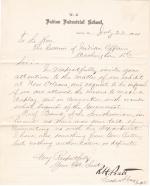
Richard Henry Pratt requests information from the Indian Affairs Office regarding an exhibit for New Orleans. Pratt mentions that Spencer Fullerton Baird of the Smithsonian Institute has mentioned building a display in conjunction with the Carlisle Indian School as well as an inquiry from General Eaton.
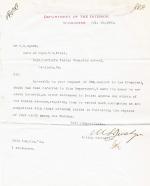
Acting Secretary in the Department of the Interior M. S. Juslyn writes to Doctor Cornelius Rea Agnew enclosing an order securing Agency and Indian Service assistance for Agnew while he is in the West.
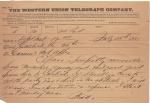
Richard Henry Pratt informs the Office of Indian Affairs that the El Paso Station is accessible from the Mescalero Agency if a party of students is being sent to the Carlisle Indian School. Pratt ends by stating that he is heading West on Monday.
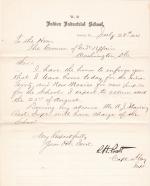
Richard Henry Pratt informs the Bureau of Indian Affairs that he is leaving for the Indian Territory and New Mexico for new pupils for the Carlisle Indian School. In his absence he leaves A. J. Standing in charge of the School.
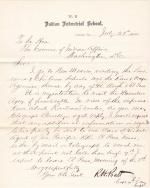
Richard Henry Pratt provides his travel plans to the Bureau of Indian Affairs for his trip West to recruit students for the Carlisle Indian School. He includes stops at the Lawrence and Chilocco Indian Schools as well as the Kaw and Osage Agencies.
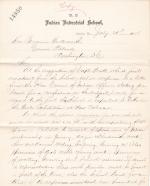
Alfred John Standing provides a copy of his letter to the Commissioner of the Patent Office Benjamin Butterworth to the Bureau of Indian Affairs regarding a potential Carlisle Indian School exhibit at the Government Exhibition in New Orleans. Standing provides an estimate of $2500 if the school is attend along with students, a teacher, and the…
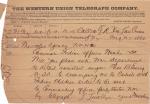
William H. H. Llewellyn, requests that Assistant Surgeon Charles B. Ewing be given permission from the War Department to accompany him to the Carlisle Indian School with a delegation of students.
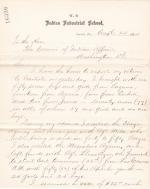
Richard Henry Pratt reports his return to the Carlisle Indian School from his student recruiting trip out West along with 77 students. He notes that he brought back 57 students from Laguna, 14 from Acoma, four from Cochiti, and two from Jemes. Pratt also notes that he made arrangements with the Osage and Mescalero Agencies to send additional…
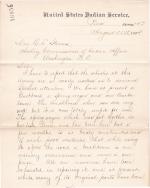
Roswell G. Wheeler, U.S. Indian Agent for the Pima Agency, requests a new spring wagon to replace the vehicles currently in use at the Agency. Porter in particular notes the poor quality of the spring wagon that was recently purchased from the Carlisle Indian School.
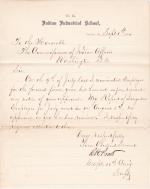
Richard Henry Pratt requests the Office of Indian Affairs take action on his nomination of employees for the 1885 fiscal year and his report of irregular employees for July 1884.

William H. H. Llewellyn, U.S. Indian Agent for the Mescalero Agency, notes that he was unable to secure any girls from the agency to send to the Carlisle Indian School, but he has fifty boys ready to be enrolled. Inquiries whether Richard Henry Pratt will accept the students.
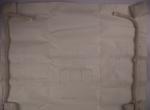
Richard Henry Pratt transmits to the Bureau of Indian Affairs plans for a building at the Carlisle Indian School to include a kitchen, dining room, laundry, and a sewing room along with a cellar for commissary supplies, root cellar, and coal bin. Pratt notes that using School labor and materials he can cut the cost down from the estimates given…
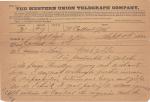
Richard Henry Pratt writes that he is unwilling to only accept boys from the Mescalero Agency and believes that it is possible to obtain girls from the agency without force despite the agent's claims. As a result, Pratt requests the transportation money meant for transporting students to the Carlisle Indian School to be returned to him in order…
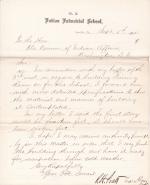
Specifications for the proposed dining room.
